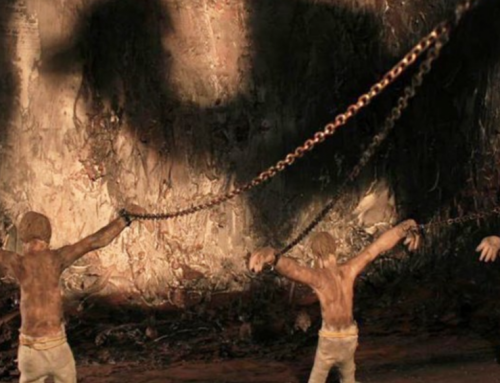
WE are the predators! (photo: courtesy Fulvio Cuccurullo, Cozumel, Mexico)
Hey you humans, it’s not Planet Earth, it’s Planet Water
How naïve, arrogant and ignorant of us to call it planet earth. Oceans cover 71% of the planet, provide 95% of all space available for life and are life sustaining to more than 100 million species, of which we humans are only one. The oceans are a universal resource, producing 70% of our oxygen, endless food (for now), re-distributing heat around the world and dominating the world’s weather systems. And ocean coast lines are home to more than half the world’s population (3.6 billion people) and 80% of all tourism takes place in coastal areas. The oceans are an economic juggernaut and a survival imperative – ours.

It's spectacular, it's alive and we're killing it. BTW, that's me enjoying the breathtaking – not literally – scenery (photo: courtesy Julio Canche).
The most delicate, productive and endangered part of life in the oceans are the coral reefs, which, beyond their spectacular beauty, supply $30 billion a year in goods and services for human consumption. We benefit from so much: Fisheries, tourism, coastal weather protection, medical advances (i.e., coral reef organisms are being used in treatments for cancer and HIV) and, of course, the personal enjoyment of escaping to protected pristine beaches or experiencing the wonders of snorkeling and scuba diving. The oceans are an immense and marvelous world but that world without coral reefs will be an infinitely poorer place. And we are losing them, faster than we realize.

Seeing is believing. And if you can't see it, at least believe it – the coral reefs are irreplaceable (photo: courtesy Julio Canche).
Coral reefs are being destroyed by human activity
Coral reefs have survived natural change for tens of thousands of years but most will not survive the unmitigated, irresponsible damage wrought by humans. Approximately 1/4 of coral reefs are already ruined beyond repair.
The ocean current known as El Nino is thought to be mainly responsible. The US State Department says that climate change, fueled by pollution, is almost certainly the main culprit. In some areas more than 95% of shallow water corals have died, killed by warm bodies of water being pushed through the oceans by the El Nino current. This is called “coral bleaching.” Jason Rubens of the Global Reef Monitoring Network says, “We are witnessing it at the highest levels on record. The damage to coral has been spectacular and that damage has spread to the Great Barrier Reef, most parts of South-East Asia, some parts of the Pacific and the Caribbean.” For every living species in the oceans it is a pandemic.

She's hanging on for dear life (photo: courtesy Julio Canche).
A few facts:
- 58% of the world’s coral reefs are potentially threatened by human activity.
- We have already lost 27% of the world’s coral reefs. If present rates of destruction are allowed to continue, 60% of the world’s coral reefs will be destroyed over the next 30 years. Many will probably die before you. That includes the world’s largest reef, the Great Barrier Reef off Australia, which could be dead within 30 years unless measures are taken now to slow climate change.
- More than 80% of the world’s shallow reefs are severely over-fished.
- Coral reefs are found in 109 countries; significant reef degradation has occurred in 93
- For over a 100 years, from 1876-1979, only three bleaching events (caused by rising water temperatures) were recorded, but in just 13 years, from 1980 until 1993, 60 bleaching events were recorded. And by 2002 more than 400 such events were recorded.

If he could, this four foot barracuda would take a strip off of every human being who is contributing to the destruction of his world (photo: courtesy Julio Canche).
El Nino and us, we are the banditos
Climate change will destroy the world’s great coral reefs within a century, according to a report by German and Australian marine scientists. The researchers say governments must take action now to reduce the emissions of gases such as carbon dioxide, which cause a rise in global temperatures and coral bleaching. In 1998, the warmest year in the 20th century, every reef system in the world’s tropical oceans was affected by some degree of bleaching. And in the last 10 years, nine of those years has had the highest temperatures in the last 130 years (see recent blog). It’s getting worse and we are not getting any better at doing a damn thing about it. They say that even if governments acted now to bring down greenhouse gas emissions, it could take up to 500 years for the reefs to recover.
Of course, what we don’t need is a President of the USA who doesn’t believe in the science of climate change nor can we leave the protection of the oceans solely to a free market system that can’t see the forest for the trees or the oceans for the fish (money). Why is it that we are the only species that kills, pollutes and depletes the very resources we need for survival? And we think we’re the “intelligent” ones.

These three foot French Angel fish mate for life and they need your help in protecting their heaven. (photo: Julio Canche)
Life began in the oceans and the oceans are an integral part of human history, our cultures and our lives. We eat their bounty, mine their oil-rich floors, bask on their beaches, swim and dive in their wonders and transport goods and people across their horizons. There are very few people who are not influenced by, benefit from, and depend on the oceans. And most of those same people are the ones contributing to their destruction. Or are passively stay detached from the problem. Just remember how attached you are the next time you order salmon or sea bass or have a tuna fish sandwich or frozen fish sticks.
So what?
The biggest threat to coral reefs is climate change and we need to send a message to political and corporate leaders that global warming must be limited to under 2 degrees Celsius. It’s imperative. Corals are a World Wildlife Foundation (WWF) priority species and they treat priority species, as the most ecologically, economically and culturally important species on our “Planet Water.” Without urgent action addressing climate change, pollution, overfishing and other threats the ubiquitous coral reefs and the life-sustaining organisms they create, nurture and sustain will disappear. And our world will be much worse off because of it.

This grouper is about 4 feet, 150 lbs and 20 years old. If you don't help stop the destruction of her world she won't likely see her 25th birthday (photo: Julio Canche)
You can help! Maybe next time you are at a restaurant, in addition to giving a 15% tip to the waiter who delivers your lobster bisque or surf and turf, you can decide to give $5-10 to the coral reef that is really responsible for delivering your food. If it’s worth $15-20 to eat your favorite fish, how much is it worth to ensure that his or her descendants survive and propagate – $5, $10, $25? Come on, eat up and then give up a little extra cash. Go to the World Wildlife Foundation (WWF) and make a donation. Do it – now!
You should see it first hand

The Palancar Reef and its abundance stretches for miles along the leeward coast of Cozumel (photo: audleytravel.com).

Dive master Julio Canche knows, first hand, every inch of the Palancar Reef.
The Palancar Reef on the west coast of Cozumel Island, Mexico is one of top diving sites in the world and whether you are a snorkeler, beginning diver or pro, you can immerse yourself in the beauty of this idyllic oasis – very different from the rest of Mexico. It’s just off the Yucatan coast, a little southeast of Cancun, and it is a world on to itself. It’s magnificent, easy to get to, and very difficult not to return to again and again.
Two people you should get to know on the island. First, the man who knows every inch of the magnificent reef, Julio Canche (juliocanche@hotmail.com), dive master and underwater photographer extraordinaire . He’s with Caballito Del Caribe dive shop. And Fulvio Cuccurullo (fulviocuccurullo@yahoo.com.mx), the man who knows every inch of the island above water. Fulvio has lived on Cozumel for 31 years and is also a world experienced diver. He manages some of the finest condominium properties on the island and can direct you to the best accommodations. And if you’re lucky enough to meet him, he just might tell you about some of the finest eateries in San Miguel.
Incredible, magnificent, precious … life on Planet Water

This is where Nemo lives, amongst the anemone.

These are Christmas trees – for year round celebration.

Ms. Golden Tail Eel loves and needs her coral home.
Go see and experience this universal life on Planet Water! While it’s still there and you still can. Or at least read and learn about it. Learn and see where Nemo lives. See Christmas trees that are up for everyday celebrations. And visit the home of Ms. Golden Tail Eel and her family.
But first, give something to your favorite coral reef! (Click and give).






Leave A Comment